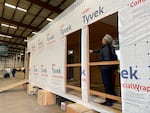Oregon lawmakers promised cities across the state an infusion of cash to address the housing crisis, giving final approval late Tuesday to a $200 million housing package.
Cities will receive “new resources in April, not August,” Rep. David Gomberg, a Democrat from the central coast said on Wednesday morning, “and that’s significant.”
It’s unusual for ambitious policy packages to pass so early in the legislative session, which is scheduled to go through June. The House approved the housing plan last week and state senators voted late Tuesday night to send it to Gov. Tina Kotek for her signature.
“The reason it passed early is because we have to start building houses now,” said Rep. Maxine Dexter, D-Portland, who chairs the House Committee on Housing and Homelessness.
It’s an early win for Kotek, a former Oregon House speaker who campaigned last year on aggressively acting to address the housing crisis and declared a state of emergency shortly after taking office.

Oregon Gov. Tina Kotek examines a mass timber affordable housing prototype at the Port of Portland in Portland, Ore., on Jan. 27, 2023. The Oregon Mass Timber Coalition aims to open a factory at the port that could mass produce homes and potentially alleviate the state's housing shortage.
Claire Rush / AP
The legislative package, made up of House Bills 2001 and 5019, funds the governor’s emergency order. The money will help rehouse about 1,200 people currently without homes, prevent homelessness for more than 8,000 people and expand shelter capacity by 600 beds within one year’s time.
Kotek lauded lawmakers in a prepared statement, saying they “answered one of Oregon’s most pressing calls for help” by supporting the package.
But not everyone is satisfied.
The money lawmakers agreed to spend is strictly limited to creating new shelter spaces. Shelters already operating don’t qualify, and as OPB reported last week, city officials across Oregon are worried shelters they currently have open are at risk of closing.
“We do not want to lose the shelter beds we already established,” Dexter said Wednesday. “The intention is to add shelter beds.”
It’s unclear how the state might step in to help city leaders who have said they are on the verge of closing existing shelters.
Portland Mayor Ted Wheeler has also expressed frustration that none of the money in the state housing package can be put toward his plan to create large, city-sanctioned mass tent encampments while also banning unsanctioned street camping. Dexter confirmed on Wednesday that the newly approved state money would not be allocated to help Wheeler’s project.
Some Republicans voiced concerns on the Senate floor Tuesday night that the measure doesn’t go far enough to cut bureaucratic red tape to help builders move swiftly.
The bill is expected to ease certain land-use restrictions and bureaucratic hurdles.
The measure also contains a large policy shift: It will make cities with a population greater than 10,000 set building targets for specific income levels, and then require them to build the actual number of affordable housing units they deem necessary. The legislation also aims to streamline the often-litigious and lengthy process of bringing more land inside urban growth boundaries.
About $27 million of the housing package will go to rural communities.
“I have rural communities in my district as well that need this housing opportunity for our homeless. Homeless don’t just reside in urban communities,” Sen. David Brock Smith, a Republican who represents a rural southern Oregon district, said on the Senate floor. “I’m going to be a yes vote so that I can be a part of the solution.”
The legislation requires agencies or groups that receive the state money to give lawmakers quarterly updates on how many people are finding new housing or staying in their current home thanks to the dollars being spent.
The legislative package also devotes $25 million to address youth homelessness, $20 million to help build more modular housing, $3 million to help developers trying to build affordable homes and $5 million toward helping farmers improve living conditions for their employees.
The Associated Press contributed to this report.